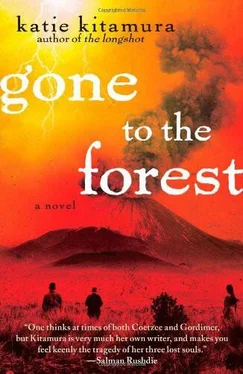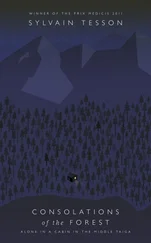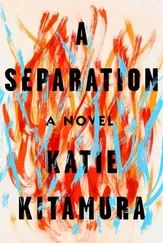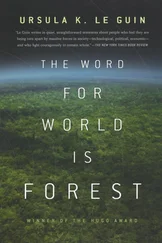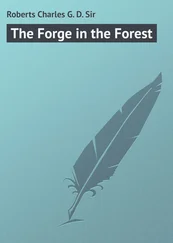His head twitches in a spasm that he cannot control. His body is defying him like the world is. The world being in his body as the world shrinks down. As it sits in his swollen belly like a ball. Apart from that there are his legs and his chest and his arms. That is all that is left. Even that is going, even that will be gone if he is not careful. He would like to put his body back together. He thinks about joining the bones and muscles and making them strong again.
He crouches on the edge of the bed. He is a collection of bones, a belly like a fruit pit and limbs like shards. His arms splintering at the touch. He cannot believe this body belongs to him. He is not sure that it does. He tries to do arm exercises. He lifts his arm to the height of his shoulder and back down again. After two lifts he cannot breathe and needs to lie down. He leans against the bedpost and grips it with both hands. He levers himself down to the bed. Then he peels his hands from the bedpost and presses them to the sheet. The air rattling in his throat.
He lies in bed and waits. He closes his eyes, but his mind does not rest. He sleeps — people tell him that he is sleeping well, they tell him it is good to rest, that he needs it. But he wakes up exhausted from dreams he cannot remember, he wakes and he does not feel refreshed as he has always felt refreshed. He dreams and the dream is as intense as hallucination. But never as intense as the pain, which is nothing but unbearable sensation. Which is bound only to get worse.
So he lies in bed in terror but nobody would guess it. Never underestimate the charisma of the dying. It has attached itself to the old man. Who grows bigger and bigger with it. He spreads across the farm, that is still shrinking from expropriation, that is still being cut down to size. He seizes hold of the house and land. He refuses the transfer of ownership. But he alone knows, can see, what is coming.
The door opens and Tom enters with the soup. The old man opens one eye and watches him as he sets the tray on the table by the bed. Tom lifts his father up and props him on pillows. He reaches for the cloth napkin and carefully unfolds it. He spreads the cloth down to the old man’s swollen belly. It is hard as a rock and getting harder by the day. Tom sets a chair beside the bed, he picks up the bowl of soup and feeds him.
When the old man returned to the farm one month ago, he was on his own two legs. The unfamiliar car — scraped and sputtering as it was — came down the track and the old man sat in the back. The girl sat beside him, and up in front Jose looked not like a driver and not like a farmhand either. The car window rolled down and the old man peered up at him.
“There have been changes.”
Tom nodded. Here, too, he wanted to say. Here, too, there have been changes. It is not the same as how you left it. He was filled with anger and relief. Don’t come back / come back. The father’s face a complicated thing as it peered up at him from inside the car. That the old man thought he could return and find it unchanged. As if nothing had happened. As if he had nothing to do with the nothing that had happened. He would like to tell his father about his resentment, his lifetime of resentment, now coming to a head and barely understood. I have things to tell you, he thought. There are things you need to hear.
There was no opportunity for that. Later that afternoon his father collapsed. He fell six feet something down to the ground. The girl crying for help. The domestics running. They picked him up and carried him to the settee.
He was shivering from cold and they covered him with a blanket. There was blood on the tiles and blood on the old man’s head. They could hear his teeth chattering inside his skull. The old man lay on the settee and tried to recover and vomited twice onto the floor. The girl stood and stared, hands on her belly. Her condition also changed. It has been like this, she said. It is getting worse.
The old man looked ill. His color was wrong. His body slipped out from under the cover — an ankle and a calf and both like sticks. Tom had never seen his father so thin, he would not have thought it possible. He turned and told one of the boys to prepare a bedroom, close to the kitchen and their quarters, where it would be easy for them to tend to the old man.
The old man heard but did not protest. He closed his eyes. The sharp smell of vomit on the air. He said to Tom that he had not been well and had come back to the farm to get better. He had come here to recover. Tom only nodded. He said the farm was not as he had left it. The old man had closed his eyes and did not respond. Tom said that things had changed here, too. I have changed. The old man still did not respond. Tom did not say anything further.
They set up three rooms for the old man. A sitting room, a study, a bedroom. The girl slept in the sitting room. The old man slept in the bedroom. He sat on the porch during the day and the girl took him on short walks. They went out across the lawn and then she would tell him he was tired. No, he would say. No. I am not tired. You are, she would tell him. And he would ignore her, but soon they would return to the house.
In this way a perimeter was established. The old man took meals in the sitting room and he spent hours in the porch’s thin spring sun. He did not regain his health. He grew thinner instead. His color went to gray and then it went to green. In certain lights, at certain times of the day. In other circumstances it returned to its usual gray. He was constantly shifting and they were losing him in the change.
The perimeter, once established, shrank rapidly. One week and he could no longer go on his morning walk. Another week and he was staggering as he made his way to the porch. He lurched from wall to furniture as he made his way across the hall. He would sit speechless for half an hour as he recovered but he would not accept their help.
Then the old man gave up the porch and stayed in his rooms. Once his father owned everything as far as he could see. Now it was three rooms and even those rooms would go. He gave ground — each foot, every inch, signaled what was coming. It was in this way that Tom realized the old man was dying. Animals died in the same way. Their territory taken away. Cattle retreating into their stalls. Wild dogs cowered in a corner. The look of it indistinguishable.
Death equalized everything. Tom saw but did not believe the old man was dying. The confusion proof that Tom was not prepared for the end that was coming. He disavowed the knowledge, the thought like a dry seed in the palm. He clenched his fist and tried to hide it, he buried it in his back pocket. Where it sat suspended, alongside his rage toward the old man and all that he had done, the old man’s fall from grace.
A pocket full of confusion. Tom concentrates on the present. He thinks that is how he will get through this — and he is not even sure, he could not say, what “this” is. He sits beside his father. He spoons soup into his mouth. Two days ago the old man decided to accept help. He had no real choice in the matter. He could no longer satisfy his body’s basic functions without it. In this he chose Tom, who counts for nothing and is therefore fit for the job. The old man is loath to be seen by the natives in a state of weakness. Whereas being seen by Tom is like being seen by no one at all.
So Tom now has the privilege of being intimate with his father and this is something new, something that once would have meant a great deal to him. For example, he now sits beside his father’s bed. Close enough to see the texture of his skin. The individual hairs on his arm. Close enough to smell the stench of his breath, which is stronger than he imagined. Tom brings the spoon to the old man’s mouth and obediently he opens. Both of them ignoring the obedience like it never happened.
Читать дальше
